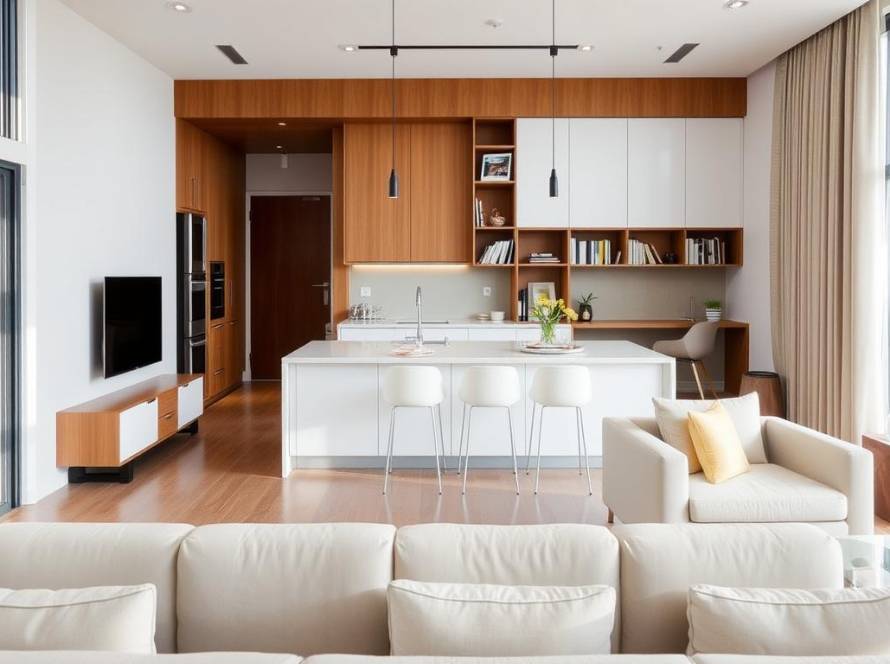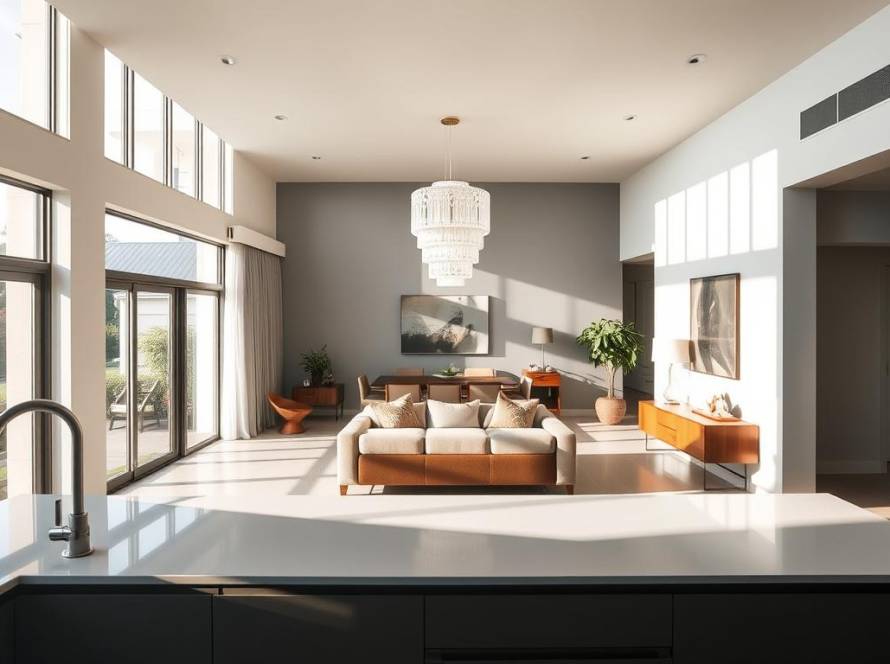Starting a house renovation can feel overwhelming, especially if it’s your first time. That’s why having a solid plan makes all the difference. With the right guidance, the whole process can be a lot less stressful and even enjoyable.
Our house renovation guide is here to help you avoid common mistakes, stick to your budget, and get the results you’re after. With a clear plan in place, you’ll be one step closer to creating the home you’ve been dreaming of.
Understanding home renovation costs is also vital to prevent financial surprises. With a well-planned renovation, you can transform your space while maintaining control over expenses.
We’ll guide you through the process, providing valuable insights and expert advice to make your renovation journey a success.
Understanding the Renovation Process in Singapore
Renovating a home in Singapore requires a thorough understanding of the local renovation process, from planning to completion. The renovation process involves several stages that are crucial for a successful outcome.
The first stage is planning, where homeowners define their renovation goals, identify must-haves, and create a renovation vision board. This stage is critical in setting the direction for the renovation.
Once the planning stage is complete, the next step is to establish a realistic renovation budget. This involves understanding the average renovation costs in Singapore and building in a contingency fund to cover unexpected expenses.
After budgeting, homeowners need to find and vet reliable contractors. This involves checking credentials, reviewing past projects, and asking the right questions to ensure that the contractor is capable of delivering the desired outcome.
Understanding the renovation process in Singapore also means being aware of the local regulations and building codes. Homeowners must comply with these regulations to avoid legal issues and ensure that their renovation is safe and durable.
By grasping the renovation process and its various stages, homeowners in Singapore can navigate their renovation journey with confidence, ensuring that their project is completed on time, within budget, and to their satisfaction.
Setting Clear Renovation Goals and Priorities
The key to a successful renovation lies in setting realistic goals and priorities. When we have a clear understanding of what we want to achieve, we can stay focused on our renovation objectives and make decisions that align with our vision.
Identifying Must-Haves vs. Nice-to-Haves
One of the crucial steps in setting renovation goals is distinguishing between must-haves and nice-to-haves. Must-haves are essential elements that we cannot compromise on, such as additional storage or improved lighting. Nice-to-haves, on the other hand, are features that would be great to have but are not essential, like a luxurious bathroom or a state-of-the-art kitchen.
- List your must-haves and nice-to-haves.
- Prioritize your must-haves.
- Consider compromises on nice-to-haves if budget constraints arise.
Creating a Renovation Vision Board
A renovation vision board is a visual representation of our renovation goals. It helps us to clarify our design preferences and communicate our ideas to contractors and designers. We can create a physical board or a digital one using tools like Pinterest.
Balancing Aesthetics with Practicality
While aesthetics play a significant role in home design, practicality is equally important. We need to strike a balance between how our home looks and how it functions. For instance, we might want a beautiful, spacious kitchen, but we also need to consider the workflow and storage needs.
- Consider the functionality of each room.
- Think about the flow of your home.
- Balance style with practical considerations like durability and maintenance.
By setting clear renovation goals and priorities, we can ensure that our renovation project meets our needs and stays within our budget. It’s about finding the right balance between our desires and the practical realities of renovation.
Establishing a Realistic Renovation Budget
Creating a realistic renovation budget is crucial for a stress-free renovation experience in Singapore. A well-planned budget helps you avoid financial stress and ensures that your renovation project stays on track. To achieve this, it’s essential to understand the various components that make up your renovation budget.
Average Renovation Costs in Singapore
The average cost of renovation in Singapore can vary widely, depending on the scope of the project, materials chosen, and the size of your home. For instance, a basic renovation (including painting, flooring, and minor carpentry work) can cost between SGD 30 to SGD 60 per square foot. For a more comprehensive renovation involving high-end finishes and complex carpentry, costs can range from SGD 100 to SGD 200 per square foot or more.
Understanding these costs is crucial for setting a realistic budget. It’s also important to research and gather quotations from multiple contractors to get a better understanding of the going rates for different aspects of your renovation.
Not sure where to start? Reach out to Fortified for a personalised quote and let us help you plan your renovation budget with clarity and confidence.
Building in a Contingency Fund
No matter how well you plan, unexpected expenses can arise during a renovation. This is where a contingency fund comes into play. Experts recommend allocating 10% to 20% of your total renovation budget to a contingency fund. This fund will help you cover any unexpected costs, ensuring that your renovation stays within budget.
Having a contingency fund in place provides peace of mind and flexibility. It allows you to make decisions without being constrained by immediate budget concerns, ensuring that your renovation meets your expectations.
Financing Options for Home Renovations in Singapore
For many homeowners, financing is a crucial aspect of renovation. In Singapore, there are several financing options available, including renovation loans from banks and financial institutions. These loans often come with competitive interest rates and flexible repayment terms.
When considering financing options, it’s essential to compare the interest rates, repayment terms, and any associated fees. Some banks offer specialised renovation loans that cater to the needs of homeowners, providing a convenient way to fund your renovation.
By understanding your renovation costs, building in a contingency fund, and exploring financing options, you can establish a realistic renovation budget that meets your needs and ensures a successful renovation project.
Finding and Vetting Reliable Contractors
A reliable contractor is the backbone of any successful home renovation project in Singapore. With so many contractors available, it can be challenging to find one you can trust. We will guide you through the process of finding and vetting reliable contractors to ensure your renovation project is completed on time, within budget, and to your satisfaction with this house renovation guide.
Where to Find Reputable Contractors in Singapore
Finding the right contractor starts with knowing where to look. In Singapore, you can find reputable contractors through:
- Word of mouth referrals from friends, family, or colleagues who have recently renovated their homes.
- Online directories and review platforms such as Renopedia or HomeRenovationGuide.
- Social media and online forums where homeowners share their experiences.
- Industry associations like the Singapore Renovation Contractors and Materials Suppliers Association (SRCMAS).
Questions to Ask Potential Contractors
Once you have a list of potential contractors, it’s crucial to ask the right questions to gauge their suitability for your project. Some key questions include:
- Can you provide references from previous clients?
- What is your experience with projects similar to mine?
- How do you handle unexpected issues that arise during the renovation?
- What is your payment structure, and are there any additional costs I should be aware of?
Checking Credentials and Past Projects
Verifying a contractor’s credentials and reviewing their past projects is essential to ensure they are capable of delivering your renovation project as envisioned. Check if they are registered with the relevant authorities and have the necessary licenses. Reviewing their portfolio will give you insight into their work quality and style.
Red Flags to Watch Out For
During your vetting process, be aware of red flags that may indicate a contractor is not reliable. These include:
- Unusually low quotes that seem too good to be true.
- Lack of transparency regarding their processes or costs.
- Poor communication or unresponsiveness to your queries.
- No references or a reluctance to provide them.
By being diligent in your search and thorough in your vetting process, you can significantly increase the chances of a successful renovation project. Remember, a reliable contractor is key to bringing your renovation vision to life.
Understanding Renovation Contracts and Quotations
A comprehensive understanding of renovation contracts and quotations can make a significant difference in the success of your house renovation project. A well-drafted renovation contract protects both homeowners and contractors by clearly outlining the scope of work, timelines, and payment schedules.
Renovation contracts are legally binding agreements that ensure all parties involved are on the same page. When reviewing a renovation contract, it’s essential to pay attention to several key elements, including the scope of work, project timeline, payment terms, and any warranties or guarantees provided by the contractor.
Quotations are another critical component of the renovation process. A detailed quotation should include a breakdown of costs for materials, labour, and any additional expenses. When comparing quotations from different contractors, it’s crucial to ensure that you’re comparing like-for-like services and that all necessary works are included.
To effectively review and negotiate quotations, homeowners should:
- Verify that all aspects of the renovation are included in the quotation.
- Check for any potential hidden costs or charges.
- Ensure that the payment schedule is clear and reasonable.
- Ask about any warranties or guarantees provided for the work and materials.
By understanding the intricacies of renovation contracts and quotations, homeowners in Singapore can better navigate the renovation process, avoid potential disputes, and ensure that their project is completed on time and within budget.
Comprehensive House Renovation Guide for Beginners
A well-planned renovation is crucial for a stress-free experience, and we’re about to dive into the details. As a beginner, it’s essential to understand the renovation process to avoid common pitfalls and ensure a successful outcome.
Renovation Sequence and Timeline
A well-planned renovation sequence helps ensure a smooth renovation process. Typically, the renovation sequence involves several stages, including:
- Pre-renovation preparation, such as clearing the area and protecting flooring
- Demolition and removal of existing structures
- Electrical and plumbing works
- Installation of new fixtures and fittings
- Finishing works, such as painting and flooring installation
Understanding the renovation sequence and timeline is vital to managing your expectations and ensuring that your project stays on track.
Managing Expectations
Managing expectations is critical to a successful renovation project. It’s essential to have a clear understanding of what can be achieved within your budget and timeline. We recommend:
- Setting realistic goals and priorities
- Understanding the potential risks and challenges associated with renovation projects
- Establishing a contingency fund to cover unexpected expenses
Communicating Effectively with Your Contractor
Effective communication with your contractor is vital to ensuring that your renovation project is completed on time, within budget, and to your satisfaction. We suggest:
- Regularly scheduled meetings to discuss progress and address any concerns
- Clear and concise communication of your needs and expectations
- Being open to feedback and suggestions from your contractor
Handling Unexpected Issues
Despite the best planning, unexpected issues can arise during a renovation project. It’s essential to be prepared and have a plan in place for addressing these issues. This may involve:
- Identifying potential risks and having a contingency plan in place
- Being flexible and adaptable when unexpected issues arise
- Communicating effectively with your contractor to resolve issues promptly
By following this comprehensive house renovation guide, you’ll be well-equipped to navigate the renovation process and achieve a successful outcome.

Navigating HDB and Condo Renovation Restrictions
When renovating in Singapore, it’s vital to comprehend the restrictions imposed on HDB and condo properties. As homeowners, we must be aware of these regulations to avoid potential issues and ensure a smooth renovation process.
Renovation restrictions in Singapore vary between HDB flats and condominiums, with each having its own set of rules. For HDB flats, the Housing and Development Board (HDB) imposes specific guidelines to maintain the structural integrity and safety of the buildings. These guidelines often include restrictions on hacking of walls, removal of certain structural elements, and the installation of electrical and plumbing systems.
For condominiums, the renovation restrictions are typically governed by the management corporation or the building’s management committee. These restrictions may include rules on noise levels, working hours, and the disposal of renovation waste. It’s essential to familiarize ourselves with these rules to avoid fines or penalties.
To navigate these restrictions effectively, we should:
- Consult with our contractors or renovation experts who are familiar with the local regulations.
- Check with the relevant authorities, such as the HDB or our condo’s management office, for specific guidelines.
- Carefully review our renovation plans to ensure compliance with the applicable restrictions.
By understanding and adhering to these renovation restrictions, we can ensure a successful and stress-free renovation experience for our HDB or condo properties in Singapore.
Common First-Time Renovation Mistakes to Avoid
As a first-time renovator, you’re not alone in facing challenges; understanding common renovation mistakes can save you time and money. Renovating your home is a significant undertaking, and being aware of the pitfalls can help you navigate the process more effectively.
Poor Planning Pitfalls
One of the most significant renovation mistakes is poor planning. This can include not having a clear vision for your renovation, failing to measure spaces accurately, or not considering the practical aspects of your design choices. To avoid this, take the time to create a detailed plan, including a realistic timeline and budget.
- Define your renovation goals clearly
- Measure your space accurately
- Research and plan for potential issues
Budget Blowouts and How to Prevent Them
Budget blowouts are another common issue faced by first-time renovators. To prevent this, it’s crucial to establish a realistic budget that includes a contingency fund for unexpected expenses. Regularly reviewing and updating your budget can also help you stay on track.
- Set a realistic budget based on your needs and research
- Include a contingency fund of at least 10-20% of your total budget
- Regularly review your expenses to catch any potential blowouts early
Communication Breakdowns with Contractors
Effective communication with your contractor is vital to the success of your renovation. Miscommunication can lead to delays, cost overruns, and a final product that doesn’t meet your expectations. To avoid this, establish clear lines of communication from the outset and ensure that you and your contractor are on the same page.
- Clearly define your expectations and needs
- Establish a regular update schedule with your contractor
- Be available to address any issues promptly
Overlooking Practical Needs for Aesthetic Choices
While aesthetics are a significant aspect of any renovation, overlooking practical needs can lead to a space that is not functional or comfortable. Striking a balance between form and function is key. Consider how you will use the space and ensure that your design choices support this.
By being aware of these common renovation mistakes, you can take proactive steps to avoid them, ensuring a smoother renovation process and a final result that meets your needs and expectations.
Conclusion
As we conclude our comprehensive house renovation guide, it’s clear that a successful renovation requires careful planning and execution. We’ve explored the essential steps to help you navigate the renovation process in Singapore, from setting clear goals and priorities to finding reliable contractors.
By understanding the renovation process, establishing a realistic budget, and avoiding common pitfalls, we can ensure a smooth and stress-free renovation journey. Our house renovation guide has equipped you with the knowledge to make informed decisions and approach your renovation with confidence.
As you embark on your renovation journey, remember that a well-planned renovation is key to achieving your dream home. With careful planning, effective communication, and a clear understanding of the renovation process, we can create a beautiful and functional living space that meets our needs.
Ready to bring your renovation plans to life? Start with a trusted expert and let Fortified help you turn your vision into reality!



